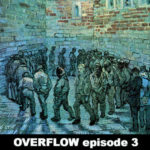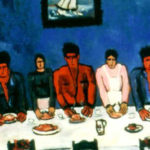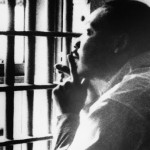We run our website the way we wished the whole internet worked: we provide high quality original content with no ads. We are funded solely by your direct support. Please consider supporting this project.
Ferguson, Racism, & the Kingdom
In light of the issues that have arisen in Ferguson, Mo this last week (for more on this click here), we thought we would offer some reflections on this topic from Greg that he wrote several years ago. A version of this piece eventually ended up in Greg’s book Myth of a Christian Religion.
___________________________________
Many white people I know sincerely believe they live in a country that is, for the most part, a land of equal opportunity that is mostly free of racism. Yes we all see the occasional overt racism that erupts now and then in America, and most of us are genuinely revolted by this. But we tend to see these events, and the attitudes behind them, as rather atypical of America as a whole. AND our awareness is stunted because our life-experience tends to blind us to racism as a subversive structural issue.
My own life serves as an example of this. I grew up with a very progressively minded father. He strongly supported the civil rights movement and was one of the pioneers who fought to include African Americans in the Tire Union in the 1950s. I watched my father wail when Martin Luther King Jr. was killed, and I heard him incessantly curse George Wallace and other “stupid *&*% damn southern racists” throughout my upbringing. My point is that my own upbringing positioned me to be, at least on a conscious level, as free of racism as I could be. But I now see that, despite all this, I still didn’t “get it.”
Evidence of how little I “got it” is that I was genuinely surprised (and discouraged) when the church I founded and pastor (Woodland Hills Church) continued to be an almost exclusively white church for the first 10 years of its existence, despite my continual preaching that racial reconciliation is one of the central reasons God became a human and died on the cross. I honestly thought that if you simply announced to the world that you believed in the equality of all people and that God wants the church to be multicultural, it would happen. But I was wrong. I didn’t get it. And the reason is because, while my heart was in the right place, and while I had some head knowledge of race issues, my life experienced had barricaded me from the real issue—the systemic, structural dimension of racism.
What I lacked, and what most white people lack, was a context where I was forced to notice something that almost all non-whites have to notice every day of their lives: namely, the reality of racist walls pervading the structure of our culture. As a white person, I didn’t have to deal with these walls. You see, for all our insistence that America is the land of equal opportunity, there is in fact a stratified “pecking order” of privilege that is largely structured by one’s access to power, social class, ethnicity, and even gender. We might think of it as a pyramid of privilege. The higher up the pyramid you are, the fewer walls you have to maneuver around. The lower down the pyramid you are, the more walls you have to maneuver around.
There are, of course, many variables that affect where one finds oneself on the pyramid – including how hard one works, how frugal you are, how talented you are, etc. This is why there are many exceptions to the observation that race is the primary determiner for where one falls on this socially stratified pyramid, and also why the exceptions are usually rather noteworthy (e.g. Michael Jordan, Oprah Winfrey, etc.). But, all other things being equal, whites (and especially white males) enjoy the privilege of being at the top of the socio-economic pyramid. This isn’t surprising, really, since America was founded (conquered) by Anglo-Europeans, and it has from the start been structured to their advantage. This is what is commonly known as white privilege.
All of this means that, among other things, whites can move around freely and not bump into the walls that increasingly box people in who are located lower down the pyramid. And this is why, all other things being equal, whites have trouble “getting it.” We simply aren’t aware of the walls. Indeed, many of us deny there’s even a pyramid of privilege to begin with. This is, after all, the land of equal opportunity. By virtue of the racialized structure we benefit from, we are, on a structural level, protected from the walls of racism. We are sheltered from a whole world of experience that non-whites, in varying degrees, are forced to live in. It is therefore hard, if not impossible, for many of us white folks to grasp, with any depth, the extent of (for example) racial profiling, red-lining, and job discrimination that non-whites experience. It’s simply not on our radar screen.
The radically different “worlds” of those who move freely at the top and those who confront walls toward the bottom was graphically illustrated during the O.J. Simpson trial. Close to 90% of African Americans thought O.J. should be acquitted. Close to that same percentage of whites thought he should be found guilty. It was an amazing moment in our history, uncovering the usually hidden chasm between the different life experiences of whites and blacks.
During this trial I asked a close African American friend to explain to me how so many African Americans thought the case against O.J. Simpson was not sufficient to prove guilt. I was genuinely nonplussed. I didn’t “get it.” He proceeded to tell me about his experience as a black boy growing up in the Bronx. On three different occasions, he watched his father get beat up and humiliated by white police officers for no legitimate reason. “You can see why its not hard for me to believe that officer Mark Furman, a known racist, planted all that evidence against O.J., ” my friend told me. “And so it goes for a good many black folk.”
As a white guy, I’d never bumped into that wall. So the idea that a police officer would risk his entire career to bring down a famous black man seemed ludicrous. To black people who have had loved ones abused by police officers, or who have themselves been abused, the suggestion wasn’t ludicrous at all.
A coin dropped in the slot (or at least began to drop in the slot) that day. I began to “get it.” I’d had many acquaintances with non-whites before, but this was the first time I was close enough to hit a wall with someone. If white people are going to “get it,” I am convinced that this is how it is usually going to happen. Seminars and classes and books on racism are good and necessary. But in the end, I believe it’s going to come down to relationships. The racist system is structured so that we don’t notice the walls all around us—walls that are too invisible for most of us white folks to notice on our own. Not only that, but we benefit from not noticing the walls, for to notice them makes a demand on our life.
For us whites to really wake up to the reality of the thick, oppressive, demonic, but (to most of us white people) invisible walls that pervade our culture, we must develop peer relationship with non-whites who will call into question some of our most basic assumptions about American culture, and perhaps about ourselves. This is not easy. It certainly doesn’t happen by cultivating cross-cultural relationships where non-whites are once again in a position of dependency on the whites. The relationships that whites need (if there’s any hope of them “getting it”) are relationships premised on equality, mutual trust, and respect.
If the church is ever going to significantly manifest the beauty of God’s diverse humanity, it’s going to take place one life at a time. Reach out. Cross ethnic and culture lines. Watch how it challenges your paradigms, enriches your life and expands your worldview.
At some point, you just might find that you truly begin to “get it.”
Related Reading

Podcast: Overflow Episode 3—Mass Incarceration, Racism, and Restorative Justice
Dan interviews Dominique Gilliard about his book Rethinking Incarceration: Advocating for Justice That Restores. http://traffic.libsyn.com/askgregboyd/Episode_0375.mp3

Confessions of a Christian Nation (Racism)
In honor of Dr. Martin Luther King Jr., Greg Boyd, Brian McLaren and Brian Zahnd apologize to the African American community for the church’s complicity in the oppression of African Americans throughout American history. Video by Rex Harsin

Last Minute Preparations
We’re all busy here at ReKnew making last minute preparations for the Open2013 conference here in St. Paul, MN. It’s our first ever event of this kind and there’s a nervous energy and anticipation. I wonder if you’ll hold this up in prayer if you weren’t able to join us? We have a last minute…

Grieving
I woke this morning to the news of the shooting death of Philando Castile by a police officer just a few miles from my home. He was pulled over because he had a broken tail light and he ended up shot to death. This comes on the heels of the Alton Sterling shooting which is…

Podcast: How Much Hope Should We Have that We Can Find Unity Amid So Much Diversity?
Greg looks at Galatians 3:26-29. http://traffic.libsyn.com/askgregboyd/Episode_0370.mp3

Listening Again to MLK
When we think of Martin Luther King, we very frequently (with good reason) remember his I Have a Dream speech. But today, we want to remember a letter he wrote while jailed in Birmingham, Alabama, that seems sadly current. Let’s listen again today, and honestly examine what MLK has to say to us in 2015. Here…

